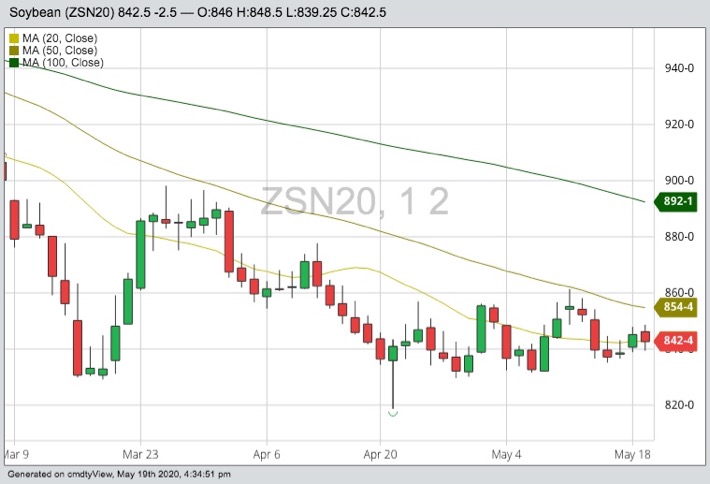Chicago | Reuters — Chicago Board of Trade soybean futures dipped on Tuesday, pressured by a fast pace of planting and slowing export deals to China after a string of sales earlier in the month, traders said.
“The trade is very dependent on China buying, and we really have not seen an announcement here in a while,” said Don Roose, president of U.S. Commodities in West Des Moines, Iowa. “It is a little bit of buyer beware because of that.”
Corn futures rose on short-covering and technical buying. Wheat futures were firmer on deteriorating crop conditions in the United States.
Read Also

ICE Canada Weekly: U.S. biodiesel mandate will be a boon for canola
Canola is poised for more gains as the trade awaits the Trump administration’s decision on the latest biodiesel mandate, said Jamie Wilton, broker with RJ O’Brien in Winnipeg.
CBOT July soft red winter wheat settled up 1-3/4 cents at $4.98-3/4 a bushel (all figures US$).
The U.S. Agriculture Department on Monday said the winter wheat crop was rated 52 per cent good to excellent as of May 17, down one percentage point from a week earlier.
Wheat futures also benefited from bargain buying after the most-active contract sank to a two-month low on Monday.
CBOT July corn futures were 1/2 cent higher at $3.21-1/4 bushel and CBOT July soybeans were 2-1/2 cents lower at $8.42-1/2 a bushel.
Corn futures hit their highest since April 24 after the July contract broke through its 30-day moving average for the first time since Jan. 24. But prices closed well off the session peak on a bearish fundamental outlook.
U.S. farmers have planted 80 per cent of their intended corn acreage and 53 per cent of their soybean crop, USDA said. Planting of both crops was well ahead of the typical pace.
Gains in the crude oil market added support to corn in hopes that ethanol demand will increase as drivers return to the roads.
“More areas are starting to emerge from coronavirus lockdowns, which may stimulate more demand for corn-based ethanol fuel,” said Matt Ammermann, commodity risk manager at INTL FCStone.
— Mark Weinraub is a Reuters commodities correspondent in Chicago; additional reporting by Michael Hogan in Hamburg and Naveen Thukral in Singapore.















